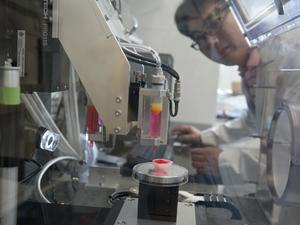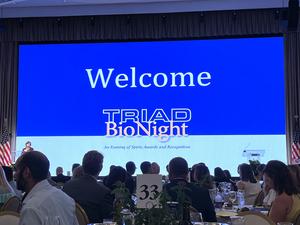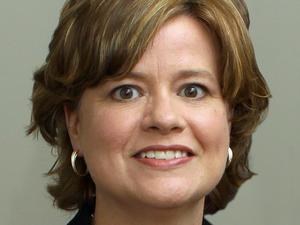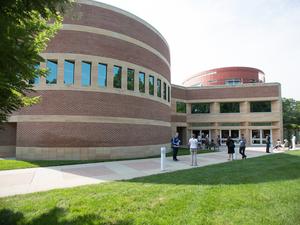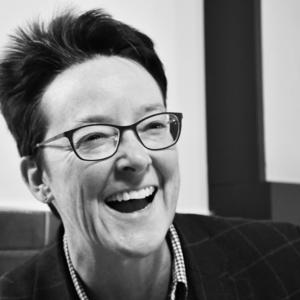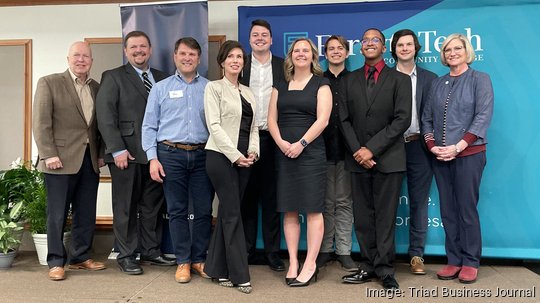
Greater Winston-Salem, Inc. has put the emphasis on innovation in the City of Arts and Innovation.
Last week, Winston-Salem’s chamber of commerce hosted its annual Tech & Innovation briefing, highlighting 11 local organizations ranging from startups to education institutions to a public company.
“Winston-Salem is a city known for innovation, driven by renowned research institutions and extensive entrepreneurial ecosystem,” said Nancy Johnston, executive director of the North Carolina Biotechnology Center’s Piedmont Triad office.
This year’s Tech & Innovation Briefing focused on life sciences organizations creating and researching new technologies, methods, pharmaceuticals and devices in their respective fields. These innovations will help the city achieve its goals of being a top mid-size city for economic growth, a more equitable community and a great place to raise a family, said Mark Owens, president and CEO of Greater Winston-Salem, Inc.
“This community is behind you, innovators and educators,” Owens said. “It’s great to tell us what’s happening and share what that next step is and what the community can do to help push you forward.”
Life sciences companies share new innovation and insights
Some of the presenters represented the largest life sciences organizations in Winston-Salem, such as the Wake Forest Institute for Regenerative Medicine (WFIRM) and Miracles in Sight.
Both organizations shared the new innovations they’ve been working on.
Phillip Clapp, an associate staff scientist at WFIRM, discussed his work on new approach methodologies (NAMs) in the biomedical research field, which include computational modeling and in-vitro assays without animal testing.
“The old approach is not working anymore. Over the last 30 years or so, we’ve begun to realize that mice aren’t furry little people; the animals we’re using for research in the lab aren’t always predictive of pharmacology and toxicology outcomes,” Clapp explained.
WFIRM researchers have developed what is called a body-on-a-chip, which is a system of miniaturized organs and tissues that react as they would in a real, life-sized body. For example, researchers can test how a human lung would respond to toxic gas exposure and countermeasures.
The invention can be used to replace animal testing, Clapp said, and will be more predictive of outcomes.
Miracles in Sight CEO Ingrid Schunder shared a new patented device that can be used for corneal transplants. said that most corneal transplants only require the cornea’s innermost layer, called the endothelium.
“Our innovation was to develop a delivery method and assembly that would take this very small tissue, put it into a device … and saves the surgeons OR time and reduces the risk of loss of tissue,” Schunder said.
She added that this also helps preserve the donated tissues from those who have passed away.
Miracles in Sight, established in 1951, is one of the oldest eye banks in the United States.
Startups share fundraising goals to get innovations to market
Several presenters represented the local life sciences startup community and shared their fundraising goals that will help them get their innovations to market or into clinical trials.
A LaRue Company, founded by CEO Angela LaRue, has designed a device for plastic surgeons and their patients with ruptured silicone breast implants. The device can save doctors 40 minutes and $3,000 per surgery.
“All silicone breast implants can leak or rupture,” LaRue said. “A lot of times a patient does not even know it until we get them in the operating room. When we do, it is a mess – it looks like Nickelodeon slimed the OR.”
She added that current removal methods can be ineffective and even dangerous. With a goal of getting the patented device to market in six to nine months, the company is looking to raise $2 million.
Regenerative medicine company Plakous Therapeutics also discussed its increased fundraising goals that will help it advance its biotherapeutic into human trials.
Plakous Therapeutics has developed a patented biotherapeutic to prevent a rare gastrointestinal disease called necrotizing enterocolitis (NEC).
Last summer, the company announced that it was looking to raise $10 million after winning $60,000 in the NC BIONEER Venture Challenge and receiving a $250,000 loan from NC Biotech. At the time, CEO Robert Boyce told TBJ that the company raised $4.5 million to date.
At the Tech & Innovation Briefing, the company said it was now looking to raise $15 million but did not provide an update on how much it had currently raised.
Tech & Innovation Briefing 2023 presenters
- A LaRue Company – a medical device company that has designed the LaRue Surgical Evacuator, a patented device that helps surgeons remove ruptured and leaking silicone breast implants
- Deep Creek Pharma – a pharmaceutical company that has a new colon cancer treatment and is spinning out of research developed at the Wake Forest University School of Medicine
- Elemance – a biotechnology company founded in 2014 that creates a wide variety of digital human body models for physics-based simulations that investigate the interaction of the human body with technology
- Forsyth Technical Community College – the second largest community college in the Triad, Forsyth Tech highlighted a transfer student who is researching the antiseptic compounds from trees in Papua New Guinea that can be used for wound therapy
- H3Pelvic Therapy Systems – a medical technology startup that aims to revolutionize pelvic pain management with low-cost, non-pharmacological products that can be used in the home
- Miracles in Sight – one of the world’s largest eye banks and one of the Triad’s largest nonprofits that supports the restoration and preservation of sight through research, innovation and transplants
- Plakous Therapeutics – a regenerative medicine company that has developed biotherapeutics to treat a rare gastrointestinal pediatric disease known as necrotizing enterocolitis (NEC)
- ProKidney – a recently public regenerative medicine company that uses a patient’s own renal cells to create a pharmaceutical that will stabilize or improve kidney function in patients with late-stage chronic kidney disease (CKD)
- RegenMed Development Organization (ReMDO) – an advocacy organization that helps regenerative medicine companies and institutions take research and technologies from bench to bedside and that is helping making Winston-Salem a global hub for the field
- Wake Forest Institute for Regenerative Medicine (WFIRM) – a recognized international leader in the field and first to successfully implant lab-grown organs into humans that is working to engineer novel therapies to repair and replace diseased tissues and organs
- Winston-Salem Forsyth County Schools – Forsyth county’s school district highlighted Will Wood, a student in the game art and design program at Atkins High School that emphasizes mechanics, code, story narrative and 3D modeling using team, project and experiential learning

